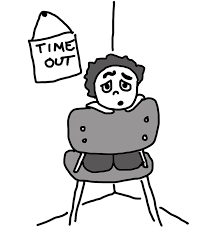
Chief Complaint: Angry Toddler
When you check into the emergency room, you are required to tell the secretary the reason for your child’s visit. In the medical world, this is referred to as your chief complaint. Your complaint is then published onto the hospital’s track board which allows the doctors and nurses to respond appropriately and determine who needs to be seen next. There are some chief complaints that we see all the time- fever, ear pain, and injury. Then of course there are some that are less common, but last week was an entirely new one for me- angry toddler!!! I immediately signed up for the case, mainly because of my own curiosity, but also because I love any opportunity to help parents through a difficult time.
Although the majority of a pediatrician’s training is rooted in human physiology and clinical diagnosis, we spend a lot of time learning about behavioral development and the common obstacles of parenthood. I was extremely fortunate to train under an amazing child psychologist and veteran pediatrician that provided me with the knowledge to take on toddlerhood. However, becoming a mother of two children with extremely different personalities forced me to experiment with different tactics and learn what really helps and what doesn’t.
Ear pain is a much easier problem to fix. I can look in the ear, see an ear infection, and prescribe an antibiotic and pain control medicine. I gently explained to this particular parent that if I had the solution to temper tantrums and angry toddlers, I would have a line out the door of parents who wanting to see me. Although I don’t know if I was able to completely solve her chief complaint, I do feel that the visit was vey helpful. Sometimes as parents we just become exhausted and feel defeated. We can all use a little guidance and motivation. So here’s my best advice for your angry toddler…let’s get started:
Fight the fights that need fighting! Being a parent to a toddler can be an exhausting job. By the end of the day our patience grows thin and naturally we become less tolerant of their messy habits and stubborn ways. Unfortunately this is also the time that our little ones become tired and start to act out. The majority of toddler breakdowns occur during the time, I like to call the “witching hour”, some time between 4:30 and 7:30 pm. You have to remember it is a long day for them too. I like to compare it to those times you come home from a tough day at work completely exhausted, and you partner gives you a hard time because of the two dishes left in the sink. Do you take the criticism well? I am not saying it should be a free for all. You should always establish limits. For our household, our limit is reached when you disrespect others. But the small breakdowns about putting toys away, eating your entire dinner, or an extra five minutes before bedtime are easier to defuse without an argument.
Allow them to make the right decision. When you observe a behavior that needs modification, acknowledge it and allow them to make a better decision. For instance, when your child takes a toy away from another child, explain to them that we share with our friends and give them an opportunity to change their behavior by giving the toy back. “Charlee, we share with our friends. You can give Jayden back his toy and take turns using it, or we are going to have to leave the park.” If they refuse to return the toy, you have to stay firm to your word and leave the park. After a few episodes of them making the wrong choice and seeing the consequences, they will start to make better choices. It is imperative that you follow through. Empty threats are just that, empty. They will eventually work against you as your child begins to realize you really won’t leave the park.
Transitions are a danger zone. Trying to get your child to leave a play date or get into the bath is an almost guaranteed breakdown. We have to respect that they are in the middle of something they think is very important. So I always suggest a timer. “Mason, you have 10 more minutes of play time. After the alarm goes off, we need to get into the bath.” Give them the consequence of not listening ahead of time. “If you decide not to get into the bath after the alarm goes off, we will lose our playtime after bath.” Again the most important thing is consistency. You have to stay true to your word. They need to understand that you mean business and that the consequences are real.
The infamous temper tantrums. Most of the time temper tantrums are a cry for attention. The research shows that the best way to deal with a temper tantrum is to completely ignore them. Continue washing the dishes, making dinner, or playing with your other children. If they are pulling on your leg, gently remove them and tell them that you don’t like this behavior and you would be more than happy to help them if they use their big boy or girl words. They will eventually finish their tantrum after they see it isn’t working and approach you. It is at this time you create a teaching moment. Eye contact is incredibly important. Have them ask you with their words and try to solve the problem depending upon what it is. Of course if it is a piece of candy at 9:00 pm, then the answer continues to be no, but maybe offer a healthier option or some quality time like reading a book.
All good things come to an end. The qualities that make them such difficult toddlers- stubbornness, determination, and assertiveness, are the qualities that will help them become successful adults. We want to help mold those behaviors, not eliminate them. Every child is different. It is important to research what works best for your child. Some children respond better to positive reinforcement while others really need strict schedules and guidelines. Teachers are a wonderful resource to help determine what works best with your child. Remember, like everything, it will pass. Our children will grow old and we will long for the days of messes and noise. You are doing a great job!!! Keep up the good work.
Hope this helps with your journey! See you next Wednesday.



